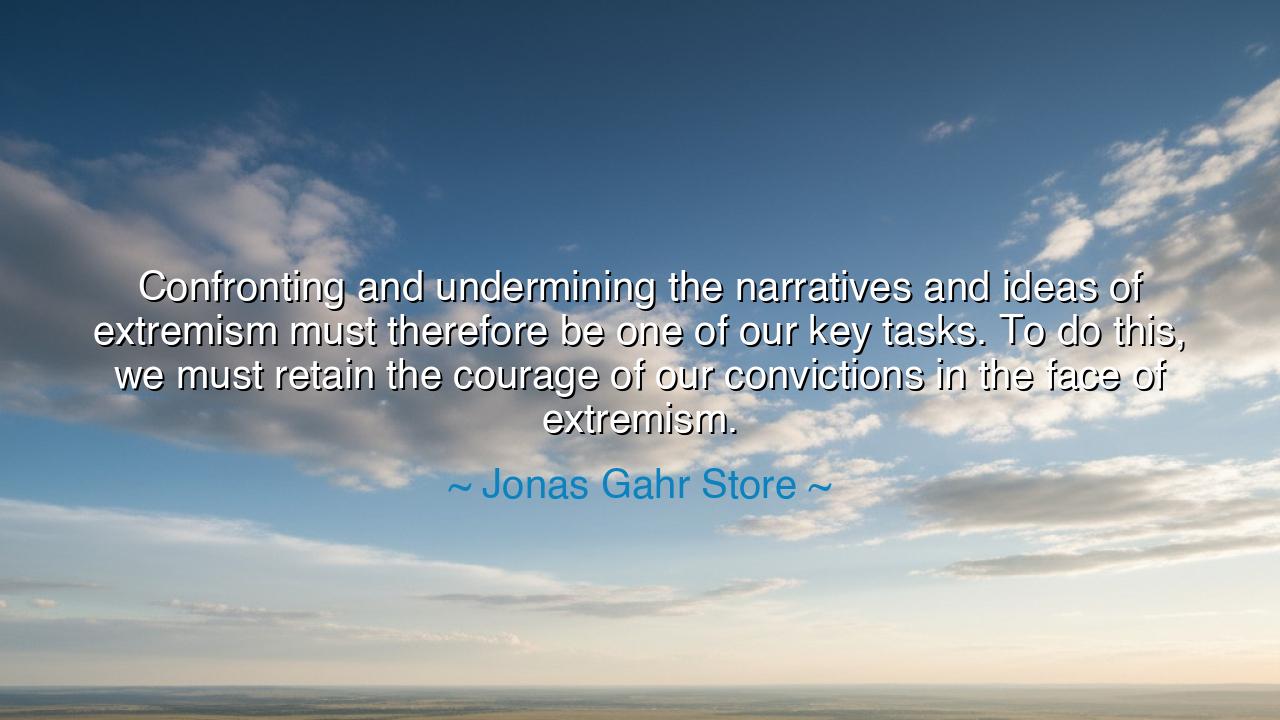
Confronting and undermining the narratives and ideas of extremism
Confronting and undermining the narratives and ideas of extremism must therefore be one of our key tasks. To do this, we must retain the courage of our convictions in the face of extremism.






“Confronting and undermining the narratives and ideas of extremism must therefore be one of our key tasks. To do this, we must retain the courage of our convictions in the face of extremism.” — Thus spoke Jonas Gahr Støre, the Norwegian statesman and advocate of peace, whose words carry the calm strength of one who believes that moral courage, not force, is the greatest weapon against hatred. His declaration reminds us that evil does not begin with weapons or armies — it begins with ideas, with lies that take root in fearful hearts. And just as the sword cannot slay a shadow, violence alone cannot destroy the poison of extremism. Only truth, spoken with conviction and lived with courage, can pierce that darkness and set the world aright.
The origin of this quote lies in Norway’s own struggle against terror and division, spoken in the years following the tragic attacks of July 22, 2011. In that hour of mourning, when a nation was wounded by hate, Støre called not for vengeance but for understanding, dialogue, and steadfast moral strength. He knew that the enemies of peace are not merely those who commit violent acts, but those who spread ideologies that glorify division, fear, and contempt. Thus, he urged his people to confront falsehood not with fury but with clarity of mind and steadfastness of heart. For as he understood, the battle for civilization is not waged in the streets alone, but in the realm of ideas — and there, the weapon of choice is courage guided by conscience.
To confront and undermine such ideas requires not rage, but patience; not cruelty, but reason; not cowardly silence, but the fearless proclamation of truth. Extremism thrives in echo chambers, in the fear of disagreement, in the weakness of those who know what is right yet do not speak it. The one who dares to stand firm in truth, even when the world shouts him down, is a warrior greater than any who wields a sword. This is what Støre means by “the courage of our convictions.” It is not arrogance or stubborn pride, but the unshakable strength to defend what is right without losing what is human.
History offers many who have embodied this principle. Nelson Mandela, after twenty-seven years of imprisonment, emerged not filled with hate for his captors, but with a vision for reconciliation. He confronted the narrative of apartheid — that people must be divided by color and birth — and undermined it not with vengeance but with forgiveness, not with violence but with moral might. His courage of conviction changed not only South Africa but the conscience of the world. For the truth he carried was stronger than the lies that had bound his people in chains, and his victory proved that extremism cannot endure before the light of moral clarity.
Yet, Støre’s message also speaks to the everyday battles within the human soul. Extremism is not only a political disease; it begins wherever people surrender to hatred, to fear, to the belief that “we” are pure and “they” are evil. To confront it is to confront the darkness within ourselves — our prejudices, our impatience, our hunger to be right rather than to be kind. It takes courage to listen when anger calls for silence, to forgive when pride demands retribution, and to build bridges where others would raise walls. The conviction that all human beings possess dignity — that truth and empathy are stronger than hate — is the foundation of any society that seeks to endure.
And this, then, is the deeper wisdom in Støre’s words: that the defense of civilization depends not on might but on moral courage. The free world will fall, not from lack of weapons, but from lack of conviction. Those who love liberty must not merely oppose extremism with laws or armies, but with a living example — with the daily practice of compassion, tolerance, and truth. Every time a person refuses to hate, every time they choose understanding over scorn, they strike a blow for peace more powerful than any bullet or bomb.
So, my listener of the future, take this teaching to heart: hold fast to your convictions, but temper them with kindness. Do not yield to the false comfort of silence when truth must be spoken. Confront hatred not with hate, but with courage — the courage to speak calmly in the storm, to love in the face of fear, to stand unyielding in defense of what is right. For in the end, the strength of free men and women lies not in the walls they build, but in the light they carry. And if we have the courage to keep that light alive, then no darkness — not even the darkness of extremism — can prevail against it.






AAdministratorAdministrator
Welcome, honored guests. Please leave a comment, we will respond soon